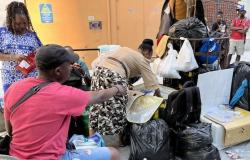Article content
The BC government is asking Health Canada to “urgently change” the province’s decriminalization policy to stop drug use in public.
Premier David Eby said Friday the change would make illicit drug use illegal in all public spaces, including inside hospitals, on transit and in parks. In January 2023, BC decriminalized possession for personal use of less than 2.5 grams of cocaine, methamphetamine, MDMA, and opioids like fentanyl.
Article content
The U-turn by the provincial government comes after repeated criticism from politicians, health workers and police about decriminalization policies including open drug use in public spaces.
“Keeping people safe is our highest priority. While we are caring and compassionate for those struggling with addiction, we do not accept street disorder that makes communities feel unsafe,” Eby said.
The province had tried to make drug use illegal in public places with its own legislation last year, however the group Harm Reduction Nurses Association challenged the bill in court. Chief Justice Christopher Hinkson of BC Supreme Court froze implementation of the BC law pending a full court hearing, saying if the laws were enacted “irreparable harm will be caused.”
“The resolution of that court issue is potentially more than a year down the road and we cannot afford to wait. We need to act now,” Eby said.
So Eby said they’ve now asked for the same changes from Health Canada.
“I have talked to the prime minister about this,” he said. “He assure me that the federal government will provide full support to ensure that police have the tools that they need.”
Article content
Eby said criminalizing drug use costs lives and money for prosecutors and police while not making the public safer, but “police do need the tools to address extraordinary circumstances where people are compromising public safety through their drug use.”
The changes would mean guidance will be given to police to “only arrest” people for simple possession in “exceptional circumstances.”
The government said the change would not recriminalize drug possession in private homes or places where someone is legally sheltering, along with overdose prevention sites and locations with drug-checking services.
When asked if the changes were an admission that the government’s decriminalization program had failed, Eby said it’s clear to him that police need the authority to be able to address the issue of public drug use.
“This is a very significant change on the ground, in communities, in response to a situation that none of us is going to tolerate, which is the situation where people feel unsafe in their parks or going to a local downtown business.”
The first said that the issue has admittedly been intensely politicized, and that’s a reality as the province heads into an election. BC residents go to the polls Oct. 19.
Article content
With a file from Bloomberg
Recommended from Editorial
-
WATCH: BC premier David Eby answers your questions

Lockboxes for drugs and weapons: Nurses fed up with drug use in BC hospitals
Bookmark our website and support our journalism: Don’t miss the news you need to know — add VancouverSun.com and TheProvince.com to your bookmarks and sign up for our newsletters here.
You can also support our journalism by becoming a digital subscriber: For just $14 a month, you can get unlimited access to The Vancouver Sun, The Province, National Post and 13 other Canadian news sites. Support us by subscribing today: The Vancouver Sun | The Province.
Share this article in your social network








